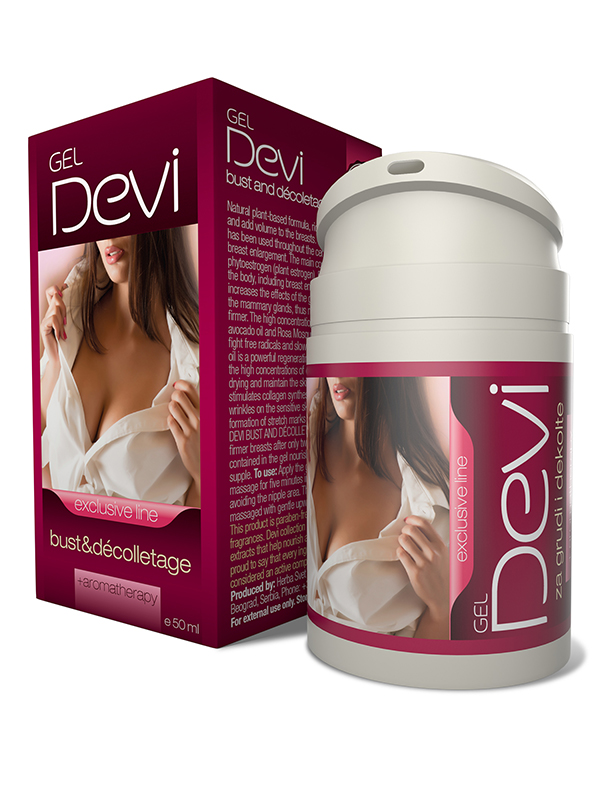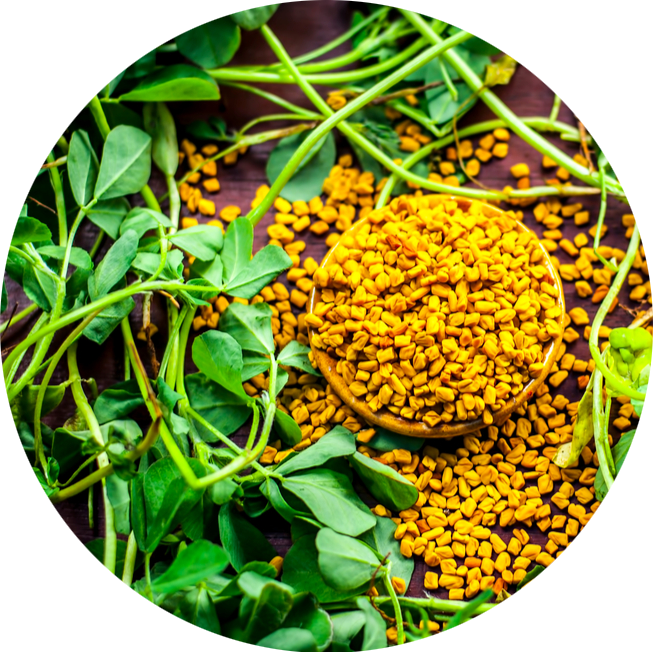(Trigonella foenum-graecum)
Medicinal herbs usually have a wide range of effects, but probably the most versatile among them is fenugreek. Also known as the Greek seed, trigonella foenum-graecum, it has been used since prehistoric times in the Mediterranean belt and Asia at home, in industry, cuisine and medicine, and even for mummification by the ancient Egyptians. The bright yellow colour that its seeds are infused with was used to dye wool and its leaves to repel mosquitoes; in the East, it is one of the usual ingredients in curry spices. Fenugreek is also known as a “cure for everything”, because it helps with a number of disorders, from wounds that are difficult to heal, through arthritis, bronchitis, abscesses, digestive disorders and disorders of the female and male reproductive systems.
But it also has its aesthetic application: phytoestrogens contained in this plant affect the circulation and water levels in the tissue and encourage the production of prolactin; this stimulates the mammary glands, which all together results in beautiful and lush breasts.
FENUGREEK, SOLUTION FOR NUMEROUS DISEASES
One might say that fenugreek is a ‘Jack of all trades’; this has been known in herbal medicine for a long time and has now been proven by modern research. This plant contains alkaloids, flavonoids, coumarins, saponins and is rich in proteins and amino acids. Studies have shown that fenugreek can lower the level of glucose in the blood and cholesterol levels, and is effective in type 1 and type 2 diabetes. The reason why it is often present in spice mixes is that it definitely aides digestion and regulates our appetite, because it is rich in fibres and lecithin, which have an impact on the proper functioning of the intestines and metabolism of fats, and can also help with acute digestive discomforts such as stomach cramps, bloating, gas and diarrhoea.
A study has proved that fenugreek significantly improves the intestinal microbiota, speeds up metabolism and even eliminates the negative consequences of a fatty diet. Fenugreek is great for the respiratory system, it relieves chronic cough, soothes irritated throat, helps treat infections of the respiratory organs and the oral cavity. Moreover, there are good indications that this seed has a beneficial therapeutic effect and can be used as part of therapy for lung cancer. Fenugreek has a proven and powerful anti-inflammatory and antioxidant effect in pulmonary fibrosis, and research has shown that it significantly and safely improves the quality of life of asthmatic patients.
There are many beneficial properties of fenugreek that have been scientifically proven:
- carminative – it stimulates the secretion of digestive enzymes and eliminates gases
- gastrostimulating – it improves the work of the digestive system
- antidiabetic -it balances blood insulin levels
- galactogogno – it mproves the secretion of milk in breastfeeding women
- hypocholesterolemic – it lowers the level of bad cholesterol
- antilhiperipidemic – it lowers the level of lipids, fats
- antioxidant – it prevents oxidative stress and protects against tumours
- hepatoprotective and nephroprotective – it protects the liver and kidneys
- anti-inflammatory – it prevents inflammation
- antiarthritic – it helps patients with rheumatoid arthritis
- antibacterial – it removes bacteria
- antifungal – it destroys fungi
- antiulcer – it protects against ulcers and alleviates the problems of existing ones
- antilithogenic – it prevents the formation of crystals in the bile and the urinary tract
- neuroprotective – it prevents Parkinson’s and Alzheimer’s disease
- anticancer – it destroys malignant cells
However, fenugreek probably has the most beneficial effect on fertility.
FENUGREEK – FERTILITY ENHANCER
This plant has traditionally been used to boost fertility, both in men and women, and modern studies have shown that this absolutely makes sense. One study examined the effect of fenugreek seeds on a group of men diagnosed with hypogonadism (testosterone deficiency) who received a 500 mg doze of this plant extract over 12 weeks. At the end of the study, it was found that, in all participants, testosterone levels increased by 90 per cent, as well as the number, quality and motility of sperm. Fenugreek has a positive effect on the cardiovascular system, mood and mental alertness.
As for women, the effect of fenugreek is even more interesting, both in terms of health and aesthetics. Fenugreek soothes turbulent PMS symptoms, regulates the cycle, helps patient suffering from the polycystic ovary syndrome – PCOS and also helps women who are entering menopause. Another clinical study conducted in 2017 followed 115 women with menopausal symptoms, between 40 and 65 years of age. In this group, 59 received 600 mg of fenugreek extract over 12 weeks. At the end of the study they reported a significant reduction in menopausal symptoms and an improvement in the quality of life.
Phytoestrogens contained in this plant affect the circulation and water levels in the tissue and encourage the production of prolactin; this stimulates the mammary glands, which all together results in beautiful and lush breasts. Fenugreek is especially useful to breastfeeding women because it increases milk secretion and does not have any negative effects on the baby. In the United States, fenugreek is seen as an ideal natural solution for the growing problem of “insufficient milk syndrome” because research has shown that it increases milk secretion by as much as 40 per cent.
FENUGREEK INFUSION, SEEDS OR SOMETHING ELSE?
And the aesthetic part? As it is rich in proteins and iron, this plant is ideal for hair care, it gives it lushness and shine, while preventing inflammation of the scalp, dryness, dandruff and baldness. But that is not all. With its phytoestrogenic effect, fenugreek will not only reduce the unpleasant symptoms of PMS and menopause, but will also improve the circulation of mammary glands, which will have a visible effect. Fenugreek plant can be used in various forms: if we want fuller breasts, it is best and simplest to apply it externally. It can be used in combination with other herbs and natural oils, and the ideal combination of ingredients is found in Devi bust and décolletage gel. In addition to this plant, the gel contains hops extract that enhances the effect of fenugreek, and there are high quality vitamin oils of jojoba, evening primrose and Chilean rose that improve circulation in tissues, slow down skin ageing, nourish it with essential fatty acids, prevent dehydration and give skin elasticity. Chilean rose oil especially stimulates collagen synthesis and thus prevents the appearance of wrinkles on the cleavage and the formation of stretch marks on the chest. Bergamot and geranium essential oils additionally nourish and soften the skin.
Devi breast gel is easy to apply: it is massaged into the breasts in circular motions several times a day, which has an immediate effect; after a few months of regular use breasts become visibly firmer and more lush, and skin of the cleavage soft and velvety.
In Middle Eastern countries, women use fenugreek in their regular diet because it gives them seductive curves and protects their hormonal balance. However, one needs to get used to the taste of fenugreek: it is quite strong and bitter and should be carefully dosed and mixed with other herbs. However, when it comes to Devi breast gel, it is easy to get used to it. Because is there a single woman who does not want firm breasts and a velvety cleavage achieved in such a simple way?

